大学英语精读课文、翻译讲课教案
大学英语精读第三版第二册教案

教学目标:1. 通过阅读课文,掌握文章的基本内容和结构。
2. 培养学生阅读理解能力和英语表达能力。
3. 提高学生的词汇量和语法水平。
4. 培养学生自主学习和合作学习的习惯。
教学重点:1. 课文主要内容和结构。
2. 课文中的重点词汇和短语。
3. 课文的语法结构。
教学难点:1. 课文中的长难句理解。
2. 课文中抽象概念的理解。
3. 课文中的词汇和短语运用。
教学工具:1. 多媒体课件2. 课文原文3. 生词表4. 语法讲解资料教学过程:一、导入1. 教师简要介绍课文背景,激发学生的学习兴趣。
2. 引导学生思考课文可能涉及的主题和内容。
二、课文阅读1. 学生自读课文,初步了解文章大意。
2. 教师提问,检查学生对课文内容的理解。
3. 学生分组讨论,进一步分析课文结构。
三、词汇学习1. 教师讲解课文中的重点词汇和短语,提供例句。
2. 学生跟读并模仿例句,巩固词汇。
3. 学生完成词汇练习,检验学习效果。
四、语法讲解1. 教师讲解课文中的语法结构,结合例句进行讲解。
2. 学生跟读并模仿例句,巩固语法知识。
3. 学生完成语法练习,检验学习效果。
五、课文翻译1. 学生分组进行课文翻译,相互检查和纠正。
2. 教师选取部分段落进行点评和讲解。
六、课堂小结1. 教师总结本节课的重点内容和难点,强调学习要点。
2. 学生分享学习心得,提出疑问。
七、课后作业1. 学生完成课后阅读练习。
2. 学生翻译课文中的长难句。
3. 学生预习下一节课内容。
教学反思:1. 教师应根据学生的学习情况,调整教学方法和手段,提高教学效果。
2. 鼓励学生积极参与课堂活动,培养学生的自主学习能力。
3. 关注学生的学习进度,及时调整教学计划,确保教学目标的实现。
教学课时:2课时备注:本教案仅供参考,教师可根据实际情况进行调整。
大学英语精读第三册课教案
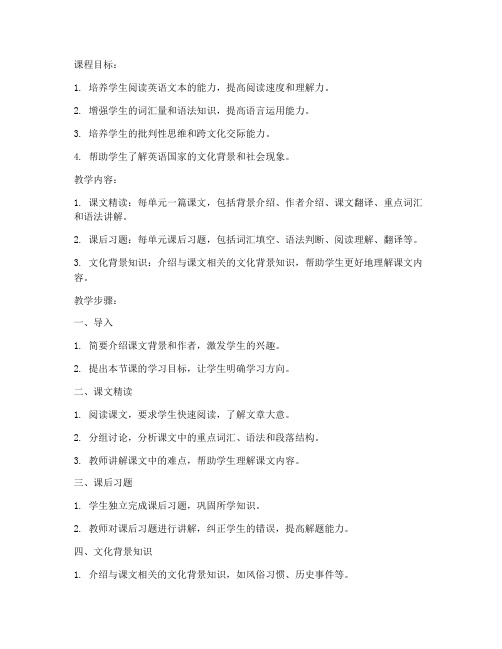
课程目标:1. 培养学生阅读英语文本的能力,提高阅读速度和理解力。
2. 增强学生的词汇量和语法知识,提高语言运用能力。
3. 培养学生的批判性思维和跨文化交际能力。
4. 帮助学生了解英语国家的文化背景和社会现象。
教学内容:1. 课文精读:每单元一篇课文,包括背景介绍、作者介绍、课文翻译、重点词汇和语法讲解。
2. 课后习题:每单元课后习题,包括词汇填空、语法判断、阅读理解、翻译等。
3. 文化背景知识:介绍与课文相关的文化背景知识,帮助学生更好地理解课文内容。
教学步骤:一、导入1. 简要介绍课文背景和作者,激发学生的兴趣。
2. 提出本节课的学习目标,让学生明确学习方向。
二、课文精读1. 阅读课文,要求学生快速阅读,了解文章大意。
2. 分组讨论,分析课文中的重点词汇、语法和段落结构。
3. 教师讲解课文中的难点,帮助学生理解课文内容。
三、课后习题1. 学生独立完成课后习题,巩固所学知识。
2. 教师对课后习题进行讲解,纠正学生的错误,提高解题能力。
四、文化背景知识1. 介绍与课文相关的文化背景知识,如风俗习惯、历史事件等。
2. 分析课文中的文化差异,提高学生的跨文化交际能力。
五、总结与反思1. 教师对本节课的学习内容进行总结,强调重点和难点。
2. 学生分享学习心得,提出自己的疑问和观点。
教学资源:1. 教材:《大学英语精读第三册》2. 教学课件:课文翻译、课后习题、文化背景知识等3. 网络资源:英语学习网站、在线词典等教学评价:1. 课堂参与度:观察学生在课堂上的发言和互动情况。
2. 课后作业完成情况:检查学生的课后习题完成情况,了解学生对知识的掌握程度。
3. 期末考试:通过期末考试检验学生的学习成果。
教学反思:1. 关注学生的学习需求,调整教学内容和方法。
2. 注重培养学生的自主学习能力,提高课堂效率。
3. 加强与学生之间的沟通,营造良好的学习氛围。
大学英语精读教案
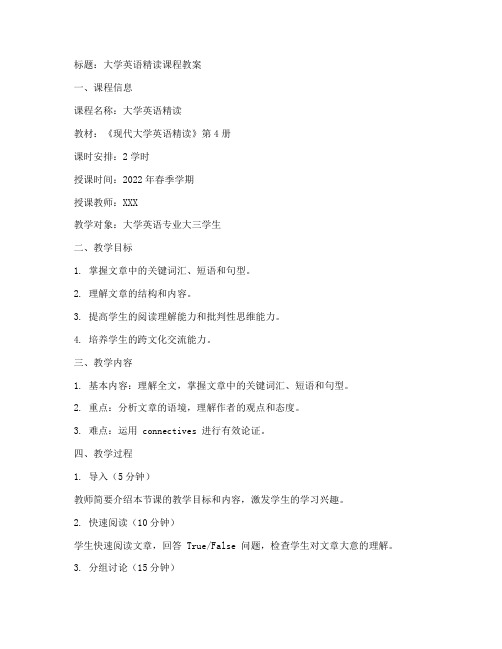
标题:大学英语精读课程教案一、课程信息课程名称:大学英语精读教材:《现代大学英语精读》第4册课时安排:2学时授课时间:2022年春季学期授课教师:XXX教学对象:大学英语专业大三学生二、教学目标1. 掌握文章中的关键词汇、短语和句型。
2. 理解文章的结构和内容。
3. 提高学生的阅读理解能力和批判性思维能力。
4. 培养学生的跨文化交流能力。
三、教学内容1. 基本内容:理解全文,掌握文章中的关键词汇、短语和句型。
2. 重点:分析文章的语境,理解作者的观点和态度。
3. 难点:运用 connectives 进行有效论证。
四、教学过程1. 导入(5分钟)教师简要介绍本节课的教学目标和内容,激发学生的学习兴趣。
2. 快速阅读(10分钟)学生快速阅读文章,回答 True/False 问题,检查学生对文章大意的理解。
3. 分组讨论(15分钟)学生分成小组,讨论文章中的关键词汇、短语和句型,分享学习心得。
4. 词汇讲解(15分钟)教师讲解文章中的关键词汇、短语和句型,引导学生运用所学知识进行分析。
5. 深入阅读(30分钟)学生深入阅读文章,分析文章的结构和内容,理解作者的观点和态度。
6. 小组展示(10分钟)各小组展示讨论成果,分享对文章的理解和感悟。
7. 课堂小结(5分钟)教师总结本节课的主要内容,强调重点和难点。
8. 作业布置(5分钟)教师布置作业,要求学生复习本节课的内容,并进行相关练习。
五、教学方法1. 讲授法:教师讲解文章中的关键词汇、短语和句型,引导学生进行分析。
2. 讨论法:学生分组讨论,分享学习心得,培养合作精神。
3. 案例分析法:教师提供实例,引导学生运用所学知识进行分析。
4. 小组展示法:学生分组展示讨论成果,提高表达能力和交流能力。
六、教学评价1. 课堂参与度:观察学生在课堂上的发言和讨论情况,评估学生的参与程度。
2. 作业完成情况:检查学生作业的完成质量,评估学生的学习效果。
3. 小组展示:评估学生在小组展示中的表现,包括表达能力、逻辑思维和团队合作能力。
大学英语精读1教案

课时安排:2课时授课时间:2023年X月X日教学目的和要求:1. 掌握:理解课文主题,学习并运用关键词汇和短语,掌握一些常用的句型。
2. 熟悉:了解课文结构,分析文章段落大意,提高阅读理解能力。
3. 了解:了解作者观点,拓展相关知识,提高跨文化交际能力。
教学内容:1. 课文:《英语学习策略》2. 词汇:strategies, techniques, memorize, practice, combine, etc.3. 句型:What strategies do you use to learn English? How do you memorize new words?教学过程:第一课时一、导入1. 提问:同学们,你们在英语学习过程中遇到过哪些困难?有哪些有效的学习方法?2. 介绍本节课的主题:英语学习策略。
二、课文阅读1. 学生自读课文,了解文章大意。
2. 教师讲解课文中的重点词汇和短语,如:strategies, techniques, memorize, practice, combine等。
3. 分析文章结构,讲解段落大意。
三、课堂讨论1. 提问:文章中提到了哪些英语学习策略?2. 学生分组讨论,分享自己的英语学习经验。
四、句型练习1. 教师讲解句型:What strategies do you use to learn English? How do you memorize new words?2. 学生练习句型,并用句型进行对话。
五、总结1. 教师总结本节课的学习内容,强调重点词汇和短语。
2. 学生复述课文主题,分享自己的学习心得。
第二课时一、复习1. 复习上节课学习的重点词汇和短语。
2. 学生进行句型练习。
二、课文精讲1. 教师讲解课文中的难句,如:Combining different techniques can help improve your learning efficiency.2. 分析文章中的文化背景知识。
大学英语精读第四册_教案

课程名称:大学英语精读授课班级:XX级XX班授课教师:XXX授课时间:XX周XX节教学目标:1. 掌握本册书中的关键词汇、短语和常用句型。
2. 理解课文内容,提高学生的阅读理解能力。
3. 培养学生的英语写作和口语表达能力。
4. 增强学生对西方文化的了解。
教学内容:1. 课文内容:本册书共包含10个单元,每个单元围绕一个主题展开,如科技、文化、社会现象等。
2. 词汇:学习本册书中的重点词汇,包括形容词、动词、名词、介词等。
3. 句型:掌握常用句型,如一般现在时、一般过去时、一般将来时等。
4. 写作:学习写作技巧,提高写作水平。
5. 口语:通过课堂讨论、角色扮演等方式,提高口语表达能力。
教学重点与难点:1. 重点:课文内容、重点词汇、常用句型、写作技巧、口语表达。
2. 难点:理解复杂句型、提高写作水平、口语表达能力的培养。
教学过程:一、导入1. 复习上一册书的知识,引导学生进入学习状态。
2. 介绍本册书的主要内容和教学目标。
二、课文讲解1. 预习课文,了解课文大意。
2. 分析课文结构,讲解重点词汇和句型。
3. 针对课文内容进行提问,引导学生思考。
三、写作训练1. 介绍写作技巧,如段落结构、过渡词等。
2. 学生根据所学内容进行写作练习,教师批改并给予指导。
四、口语训练1. 课堂讨论:针对课文内容进行讨论,提高学生的口语表达能力。
2. 角色扮演:模拟课文中的场景,让学生进行口语表达。
五、总结与作业1. 总结本节课的重点内容。
2. 布置课后作业,如背诵课文、完成写作练习等。
教学评价:1. 课堂表现:观察学生在课堂上的发言、参与度等。
2. 作业完成情况:检查学生的课后作业,了解学生的学习效果。
3. 写作和口语表达能力:通过写作和口语练习,评价学生的英语水平。
教学反思:1. 不断调整教学方法,提高学生的学习兴趣。
2. 注重培养学生的英语实际应用能力。
3. 及时发现学生的学习困难,给予针对性的辅导。
大学精读课教案
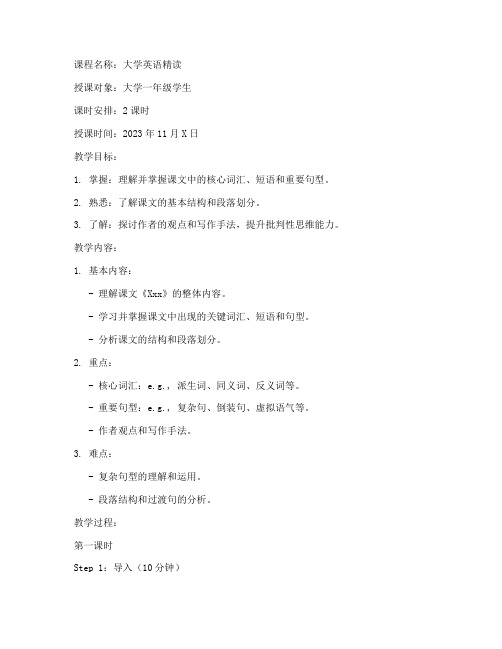
课程名称:大学英语精读授课对象:大学一年级学生课时安排:2课时授课时间:2023年11月X日教学目标:1. 掌握:理解并掌握课文中的核心词汇、短语和重要句型。
2. 熟悉:了解课文的基本结构和段落划分。
3. 了解:探讨作者的观点和写作手法,提升批判性思维能力。
教学内容:1. 基本内容:- 理解课文《Xxx》的整体内容。
- 学习并掌握课文中出现的关键词汇、短语和句型。
- 分析课文的结构和段落划分。
2. 重点:- 核心词汇:e.g., 派生词、同义词、反义词等。
- 重要句型:e.g., 复杂句、倒装句、虚拟语气等。
- 作者观点和写作手法。
3. 难点:- 复杂句型的理解和运用。
- 段落结构和过渡句的分析。
教学过程:第一课时Step 1:导入(10分钟)- 简要介绍作者背景和作品背景。
- 提出本节课的学习目标和重点。
Step 2:预习检查(10分钟)- 检查学生预习情况,提问检查学生对课文内容的初步理解。
Step 3:课文精读(40分钟)- 第一部分(10分钟):逐段讲解,重点讲解生词、短语和句型。
- 第二部分(20分钟):分析段落结构和过渡句,引导学生理解作者观点和写作手法。
- 第三部分(10分钟):小组讨论,让学生分享对课文的理解和感受。
Step 4:课堂小结(10分钟)- 总结本节课的学习内容,强调重点和难点。
- 布置课后作业。
第二课时Step 1:复习导入(10分钟)- 回顾上一节课的重点内容,检查学生对知识的掌握情况。
Step 2:课文拓展(40分钟)- 第一部分(20分钟):分析作者在课文中的论证过程,引导学生思考作者的观点。
- 第二部分(20分钟):探讨课文中的写作手法,如比喻、拟人等,分析其对表达效果的影响。
Step 3:课堂小结(10分钟)- 总结本节课的学习内容,强调重点和难点。
- 布置课后作业。
课后作业:1. 查找课文中出现的生词、短语和句型,进行造句练习。
2. 分析课文中的段落结构和过渡句,撰写一篇读书笔记。
大学英语精读第三版第四册课文及课文翻译
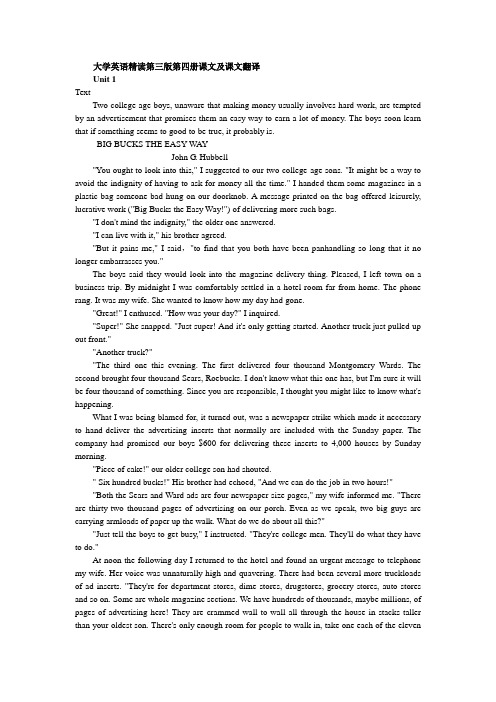
大学英语精读第三版第四册课文及课文翻译Unit 1TextTwo college-age boys, unaware that making money usually involves hard work, are tempted by an advertisement that promises them an easy way to earn a lot of money. The boys soon learn that if something seems to good to be true, it probably is.BIG BUCKS THE EASY W AYJohn G. Hubbell"You ought to look into this," I suggested to our two college-age sons. "It might be a way to avoid the indignity of having to ask for money all the time." I handed them some magazines in a plastic bag someone bad hung on our doorknob. A message printed on the bag offered leisurely, lucrative work ("Big Bucks the Easy Way!") of delivering more such bags."I don't mind the indignity," the older one answered."I can live with it," his brother agreed."But it pains me," I said,"to find that you both have been panhandling so long that it no longer embarrasses you."The boys said they would look into the magazine-delivery thing. Pleased, I left town on a business trip. By midnight I was comfortably settled in a hotel room far from home. The phone rang. It was my wife. She wanted to know how my day had gone."Great!" I enthused. "How was your day?" I inquired."Super!" She snapped. "Just super! And it's only getting started. Another truck just pulled up out front.""Another truck?""The third one this evening. The first delivered four thousand Montgomery Wards. The second brought four thousand Sears, Roebucks. I don't know what this one has, but I'm sure it will be four thousand of something. Since you are responsible, I thought you might like to know what's happening.What I was being blamed for, it turned out, was a newspaper strike which made it necessary to hand-deliver the advertising inserts that normally are included with the Sunday paper. The company had promised our boys $600 for delivering these inserts to 4,000 houses by Sunday morning."Piece of cake!" our older college son had shouted." Six hundred bucks!" His brother had echoed, "And we can do the job in two hours!""Both the Sears and Ward ads are four newspaper-size pages," my wife informed me. "There are thirty-two thousand pages of advertising on our porch. Even as we speak, two big guys are carrying armloads of paper up the walk. What do we do about all this?""Just tell the boys to get busy," I instructed. "They're college men. They'll do what they have to do."At noon the following day I returned to the hotel and found an urgent message to telephone my wife. Her voice was unnaturally high and quavering. There had been several more truckloads of ad inserts. "They're for department stores, dime stores, drugstores, grocery stores, auto stores and so on. Some are whole magazine sections. We have hundreds of thousands, maybe millions, of pages of advertising here! They are crammed wall-to-wall all through the house in stacks taller than your oldest son. There's only enough room for people to walk in, take one each of the eleveninserts, roll them together, slip a rubber band around them and slide them into a plastic bag. We have enough plastic bags to supply every takeout restaurant in America!" Her voice kept rising, as if working its way out of the range of the human ear. "All this must be delivered by seven o'clock Sunday morning.""Well, you had better get those guys banding and sliding as fast as they can, and I'll talk to you later. Got a lunch date.When I returned, there was another urgent call from my wife."Did you have a nice lunch?" she asked sweetly. I had had a marvelous steak, but knew better by now than to say so."Awful," I reported. "Some sort of sour fish. Eel, I think.""Good. Your college sons have hired their younger brothers and sisters and a couple of neighborhood children to help for five dollars each. Assembly lines have been set up. In the language of diplomacy, there is 'movement.'""That's encouraging.""No, it's not," she corrected. "It's very discouraging. They're been as it for hours. Plastic bags have been filled and piled to the ceiling, but all this hasn't made a dent, not a dent, in the situation! It's almost as if the inserts keep reproducing themselves!""Another thing," she continued. "Your college sons must learn that one does not get the best out of employees by threatening them with bodily harm.Obtaining an audience with son NO. 1, I snarled, "I'll kill you if threaten one of those kids again! Idiot! You should be offering a bonus of a dollar every hour to the worker who fills the most bags."But that would cut into our profit," he suggested."There won't be any profit unless those kids enable you to make all the deliveries on time. If they don't, you two will have to remove all that paper by yourselves. And there will be no eating or sleeping until it is removed."There was a short, thoughtful silence. Then he said, "Dad, you have just worked a profound change in my personality.""Do it!""Yes, sir!"By the following evening, there was much for my wife to report. The bonus program had worked until someone demanded to see the color of cash. Then some activist on the work force claimed that the workers had no business settling for $5 and a few competitive bonuses while the bossed collected hundreds of dollars each. The organizer had declared that all the workers were entitled to $5 per hour! They would not work another minute until the bosses agreed.The strike lasted less than two hours. In mediation, the parties agreed on $2 per hour. Gradually, the huge stacks began to shrink.As it turned out, the job was completed three hours before Sunday's 7 a.m. deadline. By the time I arrived home, the boys had already settled their accounts: $150 in labor costs, $40 for gasoline, and a like amountfor gifts—boxes of candy for saintly neighbors who had volunteered station wagons and help in delivery and dozen roses for their mother. This left them with $185 each — about two-thirds the minimum wage for the 91 hours they worked. Still, it was "enough", as one of them put it, to enable them to "avoid indignity" for quite a while.All went well for some weeks. Then one Saturday morning my attention was drawn to the odd goings-on of our two youngest sons. They kept carrying carton after carton from various corners of the house out the front door to curbside. I assumed their mother had enlisted them to remove junk for a trash pickup. Then I overheard them discussing finances."Geez, we're going to make a lot of money!""We're going to be rich!"Investigation revealed that they were offering " for sale or rent" our entire library."No! No!" I cried. "You can't sell our books!""Geez, Dad, we thought you were done with them!""You're never 'done' with books," I tried to explain."Sure you are. You read them, and you're done with them. That's it. Then you might as well make a little money from them. We wanted to avoid the indignity of having to ask you for……"一个大学男孩,不清楚赚钱需要付出艰苦的劳动,被一份许诺轻松赚大钱的广告吸引了。
大学英语精读(修订版)教案
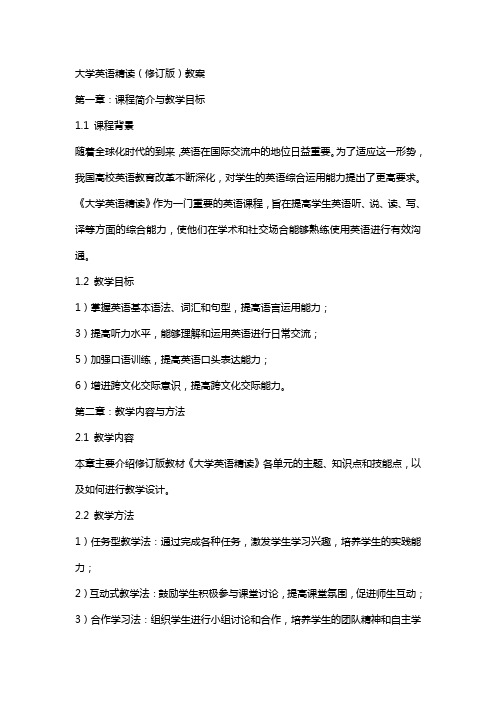
大学英语精读(修订版)教案第一章:课程简介与教学目标1.1 课程背景随着全球化时代的到来,英语在国际交流中的地位日益重要。
为了适应这一形势,我国高校英语教育改革不断深化,对学生的英语综合运用能力提出了更高要求。
《大学英语精读》作为一门重要的英语课程,旨在提高学生英语听、说、读、写、译等方面的综合能力,使他们在学术和社交场合能够熟练使用英语进行有效沟通。
1.2 教学目标1)掌握英语基本语法、词汇和句型,提高语言运用能力;3)提高听力水平,能够理解和运用英语进行日常交流;5)加强口语训练,提高英语口头表达能力;6)增进跨文化交际意识,提高跨文化交际能力。
第二章:教学内容与方法2.1 教学内容本章主要介绍修订版教材《大学英语精读》各单元的主题、知识点和技能点,以及如何进行教学设计。
2.2 教学方法1)任务型教学法:通过完成各种任务,激发学生学习兴趣,培养学生的实践能力;2)互动式教学法:鼓励学生积极参与课堂讨论,提高课堂氛围,促进师生互动;3)合作学习法:组织学生进行小组讨论和合作,培养学生的团队精神和自主学习能力;4)案例分析法:通过分析典型实例,使学生更好地理解和运用所学知识;5)跨文化教学法:引入不同文化的素材和实例,提高学生的跨文化交际能力。
第三章:课堂活动设计与实践3.1 口语表达训练设计各种口语练习活动,如角色扮演、小组讨论、口头报告等,提高学生的口头表达能力。
3.2 阅读理解训练采用问答、摘要、归纳等方法,提高学生的阅读理解能力。
3.3 写作技巧训练通过仿写、改写、写作指导等环节,提升学生的写作技巧。
3.4 听力训练运用音频、视频等教学资源,提高学生的英语听力水平。
3.5 语法和词汇学习通过例句、练习、游戏等方式,巩固学生的语法和词汇知识。
第四章:教学评价与反馈4.1 过程性评价对学生在课堂表现、作业完成、参与度等方面的表现进行评价,及时给予反馈。
4.2 终结性评价通过期中期末考试、课程论文等形式,对学生的综合英语能力进行评价。
- 1、下载文档前请自行甄别文档内容的完整性,平台不提供额外的编辑、内容补充、找答案等附加服务。
- 2、"仅部分预览"的文档,不可在线预览部分如存在完整性等问题,可反馈申请退款(可完整预览的文档不适用该条件!)。
- 3、如文档侵犯您的权益,请联系客服反馈,我们会尽快为您处理(人工客服工作时间:9:00-18:30)。
大学英语精读一课文加翻译(转自baidu知道)Some Strategies for Learning EnglishLearning English is by no means easy. It takes great diligence and prolonged effort.学习英语绝非易事.它需要刻苦和长期努力.Nevertheless, while you cannot export to gain a good command of English without sustained hard work, there are various helpful learning strategies you employ to make the task easier. Here are some of them.虽然不经过持续的刻苦努力便不能期望精通英语,然而还是有各种有用的学习策略可以用来使这一任务变得容易一些.一下便是其中的几种.1. Do not treat all new words in exactly the same way. Have you ever complained about your memory because you find it simply impossible to memorize all the new words you are learning? But, in fact, it is not your memory that is at fault. If you cram your head with too many new words at a time, some of them are bound to be crowded out. What you need to do is to deal with new words in different ways according it how frequently they occur in everyday use. While active words demand constant practice and useful words must be committed to memory, words that do not often occur in everyday situations require just a nodding acquaintance. You will find concentrating on active and useful words the most effective route to enlarging your vocabulary. 不要以完全相同的方式对待所有的生词.你可曾因为简直无法记住所学的所有生词而抱怨自己的记忆力太差?其实,责任并不在你的记忆力.如果你一下子把太多的生词塞进头脑,必定有一些生词会被挤出来.你需要做的是根据生词日常使用的频率以不同的方式对待它们.积极词汇需要经常练习,有用的词汇必须牢记,而在日常情况下不常出现的次只需要见到时认识即可.你会发现把注意力集中于积极有用的词上是扩大词汇量最有效的途径.2. Watch out for idiomatic ways of saying things. Have you ever wondered why we say, “I am interested in English”, but “I am good at French”? And have you ever asked yourself why native English speakers say, “learn the news or secret”, but “learn of someone’s success or arrival”? These are all examples of idiomatic usage. In learning English, you must pay attention not only to the meaning of a word, but also to the way native speakers use it in their daily lives.密切注意地道的表达方式.你可曾纳闷过,为什么我们说“我对英语感兴趣”是“I’m interested in English”, 而说“我精于法语”则是“I’m good at French”? 你可曾问过自己,为什么以英语为母语的人说“获悉消息或秘密”是“learn the news or secret”, 而“获悉某人的成功或到来”是“learn of someone’s successor arrival”?这些都是惯用法的例子.再学习英语时,你不仅必须注意词义,还必须注意以英语为母语的人在日常生活中如何使用它.3. Listen to English every day. Listening to English on a regular basis will not only improve your ear, but will also help you build your speaking skills. In addition to language tapes especially prepared for your course, you can also listen to English radio broadcasts, watch English TV, and see English movies. The first time you listen to a taped conversation or passage in English, you may not be able to catch a great deal. Try to get its general meaning first and listen to it over and over again. You will find that with each repetition you will get something more.每天听英语.经常听英语不仅不提高你的听力,而且有助你培养说的技能.除了专为课程准备的语言磁带外,你还可以听英语广播,看英语电视和英语电影.第一次听录好音的英语对话或语段,你也许不能听懂很多.先试着听懂大意,然后再反复地听.你会发现每次重复都会听懂很多更多的东西.4. Seize opportunities to speak. It is true that there are few situations at school where you have to communicate in English, but you can seek out opportunities to practice speaking the language. Talking with your classmates, for example, can be an easy and enjoyable way to get some practice. Also try to find native speaker on your campus and feel free to talk with them. Perhaps the easiest way to practice speaking is to rehearse aloud, since this can be done at any time, in any place, and without a partner. For instance, you can look at pictures or objects around you and try to describe them in detail. You can also rehearse everyday situations. After you have made a purchase in a shop or finished a meal in a restaurant and paid the check, pretend that all this happened in an English-speaking country and try to act it out in English.抓住机会说.的确,在学校里必须用英语交流的场合并不多,但你还是可以找到练习的英语的机会.例如,跟你的同班同学进行交谈可能就是得到一些练习的一种轻松愉快的方式.还可以找校园里以英语为母语的人跟他们随意交谈.或许练习讲英语最容易的方式是高声朗读,因为这在任何时间,任何地方,不需要搭档就可以做到.例如,你可以看着图片或身边的物件,试着对它们详加描述.你还可以复述日常情景.在商店里购物或在餐馆里吃完饭付过账后,假装这一切都发生在一个讲英语的国家,试着用英语把它表演出来.5. Read widely. It is important to read widely because is our learning environment; reading is the main and most reliable source of language input. When you choose reading materials, look for things that you find interesting, that you can understand without relying too much on a dictionary. A page a day is a good way to start. As you go on, you will find that you can do more pages a day and handle materials at a higher lever of difficulty.广泛阅读.广泛阅读很重要,因为在我们的学习环境中,阅读是最重要,最可靠的语言输入来源.在选择阅读材料时,要找你认为有趣的,不需要过多依赖词典就能看懂的东西.开始时每天读一页是个好办法.接下去,你就会发现你每天可以读更多页,而且能对付难度更高的材料.6. Write regularly. Writing is a good way to practice what you already know. Apart from compositions assigned by your teacher, you may find your own reasons for writing. A pen pal provides good motivation; you will learn a lot by trying to communicate with someone who shares your interests, but comes from a different culture. Other ways to write regularly include keeping a diary, writing a short story and summarizing the daily news.经常写,写作是练习你已经学会的东西的好方法.除了老师布置的作文,你还可以找到自己要写的理由.有个笔友可以提供很好的动力;与某个跟你趣味相投但来自不同文化的人进行交流,你会学到很多东西.经常写作的其他方式还有记日记,写小故事或概述每天的新闻.Language learning is a process of accumulation. It pays to absorb as much as you can from reading and listening and then try to put what you have learned into practice through speaking and writing.语言学习是一个积累的过程.从读和听中吸收尽量多的东西,然后再试着把学到的东西通过说和写 .。
